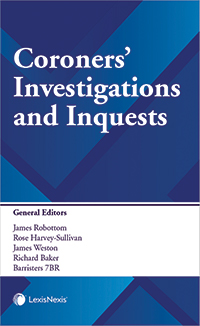
Editors: James Robottom, Rose Harvey-Sullivan, James Weston and Richard Baker
Publisher: Butterworths / LexisNexis
ISBN: 9781474317535
RRP: £139.99
Coroners’ Investigations and Inquests is the latest in the increasing number of works on coronial law and procedure. Edited by a team of barristers from 7BR, it is explicitly a work aimed at practitioners representing interested persons in coronial proceedings, and is intended to be both accessible and authoritative. Its scope ranges well beyond the inquest itself to many aspects of the coronial investigation, from its commencement all the way through to the making of reports to prevent future deaths. It also touches upon subsequent proceedings. The work is logically and thoughtfully subdivided by topic and, supported by a good index, is readily accessible, providing both commentary and, in an appendix, the most important of the relevant statutory materials.
Getting to the point
Despite the number of contributors, the work is cohesively written, with a practical focus. Excerpts from case law are generally succinct and to the point. The intended readership being legal practitioners, the balance of the material covered naturally leans heavily towards topics more central to the role of the advocate. Issues such as notification and certification are quickly covered, and wider questions such as the principles behind the construction of the present statutory architecture are identified more through their application than their origin. This leaves room, however, for the discussion of issues commonly faced by the advocate at inquest, together with useful contributions from a number of other practitioners, particularly on the issues of costs, funding and publicity.
Among its strengths are the pithy chapters on particular types of inquest—from mental health, clinical and prison deaths to less frequently explored issues of product related death and military inquests. These are sensibly chosen, helpfully structured, and will assist the practitioner by setting out the current state of the law and offering advice on commonly encountered issues—such as considerations of risk management in cases of deaths in custody, or the deceased’s mental capacity where a death has occurred following clinical treatment. For those new to these types of inquest, this will be invaluable. Even more experienced practitioners will benefit from standing back and looking afresh at these questions thematically.
There are inevitably times when such a practical style can have its limitations and where more discussion of the law would inform legal advice and submissions. There could also perhaps have been space for a little more discussion on the questioning of witnesses. The experience of coroners is all too often that this is unnecessarily and insensitively robust, sometimes seeking to trespass on areas outside of the scope of the investigation. Indeed, consideration is being given to the provision of specialist training for advocates on the issue. The work rightly identifies the fact that no one within an inquest is on trial—least of all the deceased—but would benefit from a more explicit exploration of what the right to ‘examine’ a witness actually means, and most particularly that there is neither a right nor a duty to conduct a cross- examination.
Something for everyone
Such relatively minor reservations aside, the book is generally at its most useful where it discusses and explains the law rather than simply reciting it. Kate Lumbers’s chapter on conclusions, which includes a well-informed discussion on the law of causation, is excellent, with a short but particularly good section explaining the reasons for the different approach in cases were Article 2 is engaged. There is also a very good discussion on the scope of the Article 2 inquest, a difficult topic blessed with conflicting European law, the domestic interpretation of which has in places been highly nuanced.
All in all, Coroners’ Investigations and Inquests is an accessible and up to date addition to the increasing number of works devoted to coronial inquests. Its practical focus will be most useful to the less specialist advocate, but it also has much to offer the more seasoned practitioner. Future editions will doubtless be able to build on the firm base that the first edition provides, to increase the extent to which it provides authoritative commentary capable of being cited in court.
Reviewer: David Regan, Area Coroner, South Wales Central Coroners’ Area.










